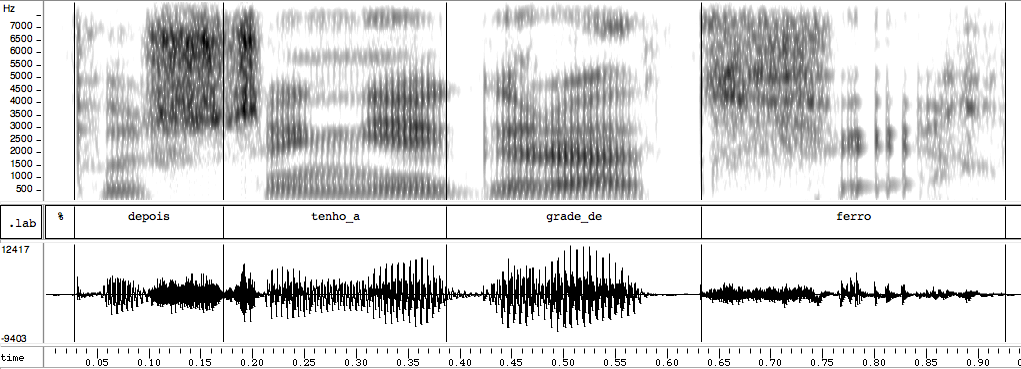Portuguese is disappearing, one vowel at a time
« previous post |
Here in Macau, a few people still speak Portuguese. (And even fewer speak Macanese Patuá, which mixes Portuguese with Cantonese, Malay, Sinhalese, and a few other linguistic ingredients.) But according to Isabel Trancoso,
who is attending the same conference here that I am, the local variety
of Portuguese lacks the extreme reductions that are transforming the
Iberian version.She sent me the following example, taken from the CORAL (map task) corpus:
…depois tenho a grade de ferro …
"afterwards I have the iron fence"
The nominal pronunciation in IPA, according to Isabel, should be something like
/dəˈpojʃ ˈtɐɲw ɐ ˈgradə də ˈfɛʀu/
Here it is as synthesized by Acapela's Portuguese voice:
But what was actually produced omitted or modified many of those segments (I'll leave it as an exercise for the reader to determine what the IPA transcription should be):

Phenomena of this general kind have been documented in varieties of Portuguese before, e.g. David Silva, "The variable deletion of unstressed vowels in Faialense Portuguese", Language Variation and Change, Oct. 1997.
But it seems that a sound change in progress is rapidly multiplying such reductions and deletions in Iberian Portuguese – Isabel reports that whenever Fernando Pereira visits Portugal, he says "now I see that you've deleted a few more vowels". She also suggested that people who speak the Portuguese-like language of neighboring Galicia have increasing difficulty in understanding the way the people in Lisbon actually talk now.
I've always had a kind of affection for optional reduction and deletion phenomena — it's like watching Latin turn into French before your eyes. And this is one area where non-native speakers have a certain advantage, since they are not subject to the "phoneme restoration effect".

Sem comentários:
Enviar um comentário